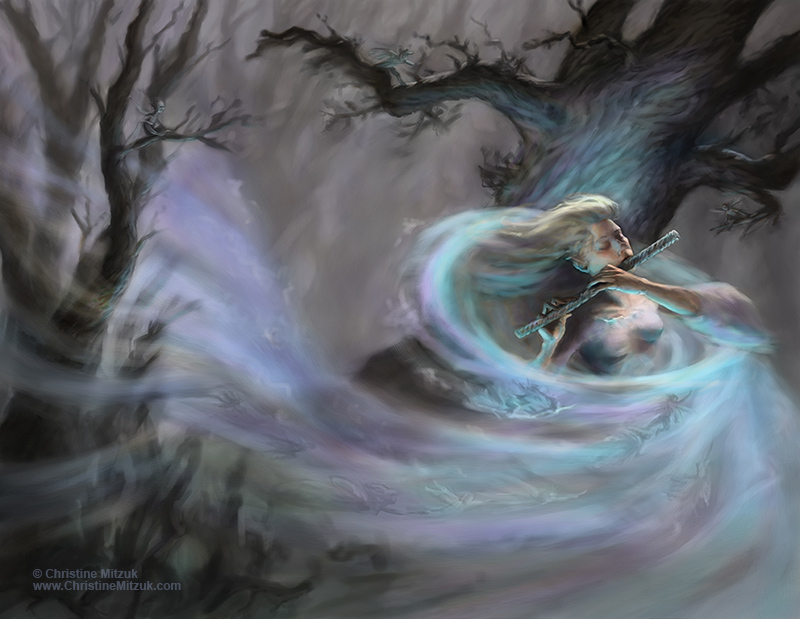Difference between revisions of "Whistle (cantrip)"
Tao alexis (talk | contribs) |
Tao alexis (talk | contribs) |
||
| Line 1: | Line 1: | ||
| − | [[File:Whistle (cantrip).jpg|right|420px|thumb| | + | '''Whistle''' is a cantrip that produces a continuous, wind-like sound, fluctuating in pitch. This gives an eerie vibe when indoors, hinting at the presence of the supernatural, even more so during the dead of night. |
| + | |||
| + | |||
| + | [[File:Whistle (cantrip).jpg|right|420px|thumb|]] | ||
{{Spelltable | {{Spelltable | ||
| name = Whistle | | name = Whistle | ||
| Line 10: | Line 13: | ||
}} | }} | ||
| − | + | produces a sustained whistling sound, similar to that which is made by the wind, with an inconsistent rise and fall in tone. Indoors, it suggests the presence of something unnatural, or that a window must be open; the former is sure to be more certain if it is the dead of night. | |
The caster can impress a message of up to six words into the sound, which a single predetermined creature will be able to consciously understand, though the creature's actual hearing of the message will be instantly doubted. This six word message will have no influence on the creature ''by itself'' ... however, if the creature has been carefully primed, so that they have other reasons to believe the truth of the message, then the whistling words may very well be that which pushes the creature over the edge. | The caster can impress a message of up to six words into the sound, which a single predetermined creature will be able to consciously understand, though the creature's actual hearing of the message will be instantly doubted. This six word message will have no influence on the creature ''by itself'' ... however, if the creature has been carefully primed, so that they have other reasons to believe the truth of the message, then the whistling words may very well be that which pushes the creature over the edge. | ||
Revision as of 19:52, 3 November 2023
Whistle is a cantrip that produces a continuous, wind-like sound, fluctuating in pitch. This gives an eerie vibe when indoors, hinting at the presence of the supernatural, even more so during the dead of night.
| Range | 30 ft. |
| Duration | 2 rounds |
| Area of Effect | 1 creature |
| Casting Time | 2 action points |
| Saving Throw | negates |
| Level | cantrip |
produces a sustained whistling sound, similar to that which is made by the wind, with an inconsistent rise and fall in tone. Indoors, it suggests the presence of something unnatural, or that a window must be open; the former is sure to be more certain if it is the dead of night.
The caster can impress a message of up to six words into the sound, which a single predetermined creature will be able to consciously understand, though the creature's actual hearing of the message will be instantly doubted. This six word message will have no influence on the creature by itself ... however, if the creature has been carefully primed, so that they have other reasons to believe the truth of the message, then the whistling words may very well be that which pushes the creature over the edge.
For example, if the creature were guilty of something, and the caster knew; and there already existed a threat of the creature being exposed for the crime; then the message to "flee and never return" might be seen as a reasonable course of action, one to be taken up immediately.
Distraction
As with all haunting sounds, whistle serves as a distraction, to urge a creature to go investigate, or be distracted for a moment. A character hearing the whistling words should make a wisdom check if the message and the sound are heard just at the moment when the listener is attacked, and needs to make a surprise roll. A failed check would indicate the attacker has a +1 bonus to surprise that creature.
This distraction could only occur when all was quiet, and attended by no more than two other persons. A loud, crackling fire would be noisy enough to counteract the cantrip's effect, but a smouldering fire would not.
Bringing the Cantrip into Play
An assassin would benefit from being able to make their rush to attack at the moment the whistling sound, and the message, was heard. This would be a matter of timing, of course; but a single guard on a street corner at night could be effectively surprised upon hearing the sound and effectively dragged out of sight.
